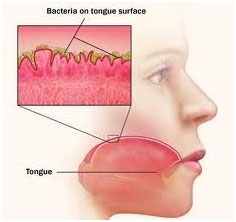Basically, all the food you eat begins to be broken down in your mouth. As foods are digested and absorbed into your bloodstream, they are eventually carried to your lungs and given off in your breath. If you eat foods with strong odors (such as garlic or onions), brushing and flossing -- even mouthwash -- merely covers up the odor temporarily. The odor will not go away completely until the foods have passed through your body.
If you don't brush and floss your teeth daily, food particles can remain in your mouth, which promotes bacterial growth between teeth, around the gums, and on the tongue. This causes bad breath. In addition, odor-causing bacteria and food particles can cause bad breath if dentures are not properly cleaned.
Smoking or chewing tobacco-based products can also cause bad breath, stain teeth, reduce your ability to taste foods, and irritate the gums.
Persistent bad breath or a bad taste in your mouth may be warning signs of gum (periodontal) disease. Gum disease is caused by the buildup of plaque on teeth. The bacteria cause toxins to form in the mouth, which irritate the gums. If gum disease continues untreated, it can damage the gums and jawbone.
Other dental causes of bad breath include poorly fitting dental appliances, yeast infections of the mouth, and dental caries. The medical condition dry mouth (also called xerostomia) can also cause bad breath. Saliva is necessary to moisten and cleanse the mouth by neutralizing acids produced by plaque and washing away dead cells that accumulate on the tongue, gums, and cheeks. If not removed, these cells decompose and can cause bad breath. Dry mouth may be caused by the side effects of various medications, salivary gland problems, or continuous breathing through the mouth.
Many other diseases and illnesses may cause bad breath. Here are some to be aware of: respiratory tract infections such as pneumonia or bronchitis, chronic sinus infections, postnasal drip, diabetes, chronic acid reflux, and liver or kidney problems.

In most cases, your dentist can treat the cause of bad breath. If your dentist determines that your mouth is healthy and that the odor is not of oral origin, you may be referred to your family doctor or to a specialist to determine the odor source and treatment plan. If the odor is due to gum disease, for example, your dentist can either treat the disease or refer you to a periodontist, a dentist who specializes in treating gum conditions.
Professional clean up / oral prophylaxis / scaling and polishing is essential at least once every six months for all individuals in order to maintain the overall health of the oral cavity. It involves the removal of plaque, tartar and stains which accumulate over a period of time.